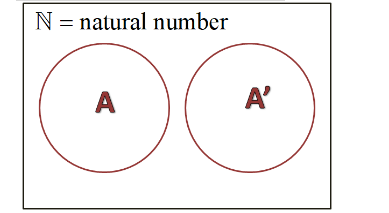
Let A be the set of all even natural numbers. What is the complement of \[A\]in \[\mathbb{N}\]?
Answer
587.4k+ views
Hint: We will be excluding all even natural numbers from the universal set of all the natural numbers in order to get the compliment for the given set.
Complete step-by-step answer:
Let us take the natural number as a universal set.
Moreover, we have been told that there is only one set A in this universal set. Therefore, \[A\] union \[A'\] will give us the universal set (\[A\cup A'=\mathbb{N}\]).
The complement of a set means to exclude all those elements already in the set from the universal set. Suppose there were three sets to be made from a Universal set. Then the complement of any one of these sets would exclude all those elements from that chosen set and will include all the other ‘left out’ elements from the other two sets.
Thus the complement of set \[A\], which holds all the even number, will be
\[A'=\{x:x\in \mathbb{N}\text{ and }x\,\,\text{is odd }\}\]
This means that if we remove all even natural numbers from \[\mathbb{N}\], we will be left out with all the odd natural numbers.

The sums can also be done by representing a Venn diagram where set \[A\] holds all even numbers and Set \[A'\] holds all odd numbers, and they are separate since there is only one set \[A\] in the whole universal set of Natural numbers. And \[A'\] all the values excluding the set of \[A\] .
Note: There is only one set \[A\] in the whole universal set of Natural numbers; thus, the complement of \[A\] will exclude all the elements of the set of \[A\].
A natural number starts from 1, so we do not take note of the negative terms. Moreover, even and odd numbers are divided for natural numbers only, not for negative integers.
Complete step-by-step answer:
Let us take the natural number as a universal set.
Moreover, we have been told that there is only one set A in this universal set. Therefore, \[A\] union \[A'\] will give us the universal set (\[A\cup A'=\mathbb{N}\]).
The complement of a set means to exclude all those elements already in the set from the universal set. Suppose there were three sets to be made from a Universal set. Then the complement of any one of these sets would exclude all those elements from that chosen set and will include all the other ‘left out’ elements from the other two sets.
Thus the complement of set \[A\], which holds all the even number, will be
\[A'=\{x:x\in \mathbb{N}\text{ and }x\,\,\text{is odd }\}\]
This means that if we remove all even natural numbers from \[\mathbb{N}\], we will be left out with all the odd natural numbers.

The sums can also be done by representing a Venn diagram where set \[A\] holds all even numbers and Set \[A'\] holds all odd numbers, and they are separate since there is only one set \[A\] in the whole universal set of Natural numbers. And \[A'\] all the values excluding the set of \[A\] .
Note: There is only one set \[A\] in the whole universal set of Natural numbers; thus, the complement of \[A\] will exclude all the elements of the set of \[A\].
A natural number starts from 1, so we do not take note of the negative terms. Moreover, even and odd numbers are divided for natural numbers only, not for negative integers.
Recently Updated Pages
Master Class 9 General Knowledge: Engaging Questions & Answers for Success

Master Class 9 Social Science: Engaging Questions & Answers for Success

Master Class 9 English: Engaging Questions & Answers for Success

Master Class 9 Maths: Engaging Questions & Answers for Success

Master Class 9 Science: Engaging Questions & Answers for Success

Class 9 Question and Answer - Your Ultimate Solutions Guide

Trending doubts
Difference Between Plant Cell and Animal Cell

Fill the blanks with the suitable prepositions 1 The class 9 english CBSE

Who is eligible for RTE class 9 social science CBSE

Which places in India experience sunrise first and class 9 social science CBSE

What is pollution? How many types of pollution? Define it

Name 10 Living and Non living things class 9 biology CBSE




